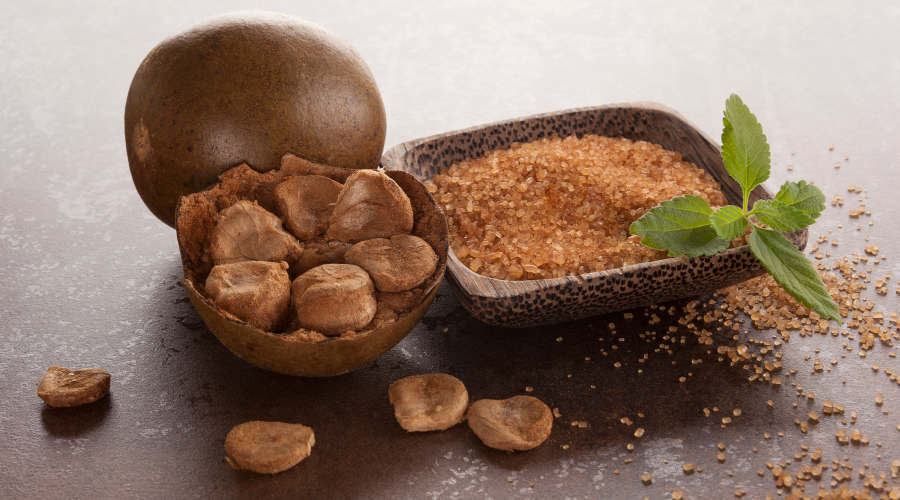

In the era of health-conscious living, more and more people are looking for alternatives to sugar. Among the various choices, the monk fruit sweetener is unique with its natural source, undiluted by artificial additives, offering intense sweetness and a health boost. This sweetener, which comes from the monk fruit, a little green gourd indigenous to Southeast Asia, is a delicious way to satisfy sweet cravings without all the negative consequences of consuming regular sugars. This comprehensive blog delves deep into monk fruit sweetener, exploring its origins, benefits, potential disadvantages, and practical applications.
History of Monk Fruit Sweetener
Siraitia grosvenorii, popularly known as monk fruit, has been honoured in Southeast Asia for many centuries due to its intense sweetness and the fact that it can be used as a remedy. Monk fruit, a name the fruit has given and attributed to the Buddhist monks who cultivated it, has been a significant part of traditional Chinese medicine and food. Today, an extract from this divine fruit becomes the basis for monk fruit sweetener, a natural alternative to sugar, praised for its incredible attributes.
Significant Properties of Monk Fruit Sweetener
Here are some of the prominent features of Monk fruit sweetener:
- Zero-Calorie Sweetness: Calorie-free nature of the monk fruit sweeteners is one of their most attractive features. Unlike conventional sugars that increase calories as well as correlate to weight gain, monk fruit sweetener provides sweetness minus guilt.
- Low Glycemic Index: Glycemic Index (GI) shows the speed at which foods raise blood glucose levels. The GI level of monk fruit sugar free sweetener is much lower, which does not result in sudden and rapid peaks in blood glucose. This makes them a perfect choice for people who are into keeping track of their blood glucose levels, particularly those who are affected by diabetes.
- Natural Origins: Monk fruit sweetener is a product that originates from a natural chemical-free source and has no additives. The extraction process requires breaking the monk fruit to obtain the juice, which is further condensed to form either the powdered or liquid form. This minimal processing retains natural fruit sweetness along with the health-promoting compounds.
- Intense Sweetness: It might seem surprising but monk fruit sugar free sweetener, which is, in its nature, calorie-free, is pretty sweet (100 to 250 times more sweet than sugar). It helps in reducing the quantity needed to enjoy the same level of sweetness as sugar and leads to lower calorie intake.
Benefits of Monk Fruit Sweetener
Here’s a list of monk fruit sugar benefits:
- Weight Management: Monk fruit sweetener offers sweetness minus the calories, thus helping in reducing overall calorie consumption which is critical to weight maintenance. It enables people to indulge in sweets without affecting their desired diets.
- Blood Sugar Control: Monk fruit sugar free sweetener is a preferred replacement because it has a low glycemic index and is ideal for those seeking sugar control. The monk fruit sweetener does not spike and crash like high-GI sweeteners; instead, it complements the blood glucose levels with an equal sweetness flow without causing fluctuations.
- Dental Health: Traditional sugars act as fuel for pathogenic bacteria and, therefore, promote tooth decay and the formation of cavities. However, monk fruit sweetener does not cause dental erosion and it is a tooth-friendly source that is supposed to preserve oral health.
- Antioxidant Properties: Mogrosides are natural antioxidants found in monk fruit. The compounds have been tested for their possible health benefits on the grounds of having anti-inflammatory and anti-cancer properties. Though more research is needed to assess the effect of mogrosides on human health, the presence of these in monk fruit sweeteners makes it an appropriate health-conscious choice.
Incorporating Monk Fruit Sweetener into Your Diet
Monk fruit sweeteners can be seamlessly integrated into various culinary creations. Here are some of the ways you can incorporate it:
- Add the fruit’s sweetness in sauces, dressings, and marinades without the calories or glycemic load.
- Sweeten the beverages like coffee, tea, and smoothies.
- Use it as a sugar replacement in cake, cookies, frosting, icing, and dessert recipes.
Conclusion
Monk fruit sweetener is a natural, calorie-free substitute for sugar, acting as a desirable option for people trying to reduce their sugar intake. Monk fruit sweetener has won a spot in the cupboards of people attempting to adopt healthy eating habits because of its low glycemic index, possible health advantages, and several uses. People can enjoy sweetness without sacrificing their health and well-being by accepting the sweetness of monk fruit.




